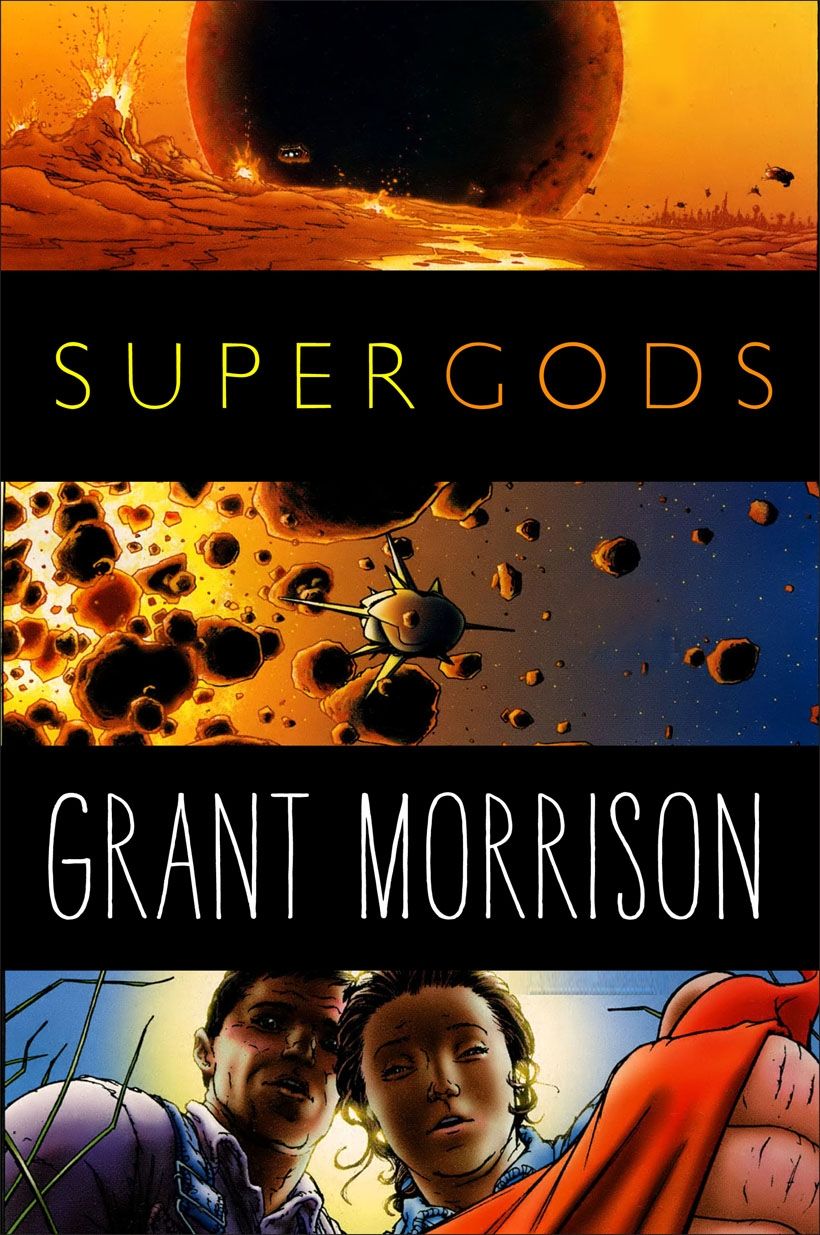Grant Morrison may be a great comic book writer, but he's a middling book writer.
Reading his new book "Supergods" is a frustrating and rewarding experience, depending on what part of the book you read. Not a history of superhero comics, nor a critical analysis or thesis or biography or anything specific, the book suffers primarily from that lack of focus. With no central conceit beyond 'Grant Morrison writing about superheroes however he wants,' "Supergods" meanders along, going wherever the whims of Morrison take it. You never know what the next chapter (or paragraph) will bring, and there's no consistency of quality. The main message I took away from "Supergods" is that Grant Morrison needed an editor on this book.
Divided into four sections based on the 'ages' of comics (Golden, Silver, Dark, and a final he simply terms 'The Renaissance'), there is a loose structure to "Supergods" that provides some sense of continuity and forward momentum. Within those sections is where it falls apart, as Morrison will provide a history lesson in the voice of the blandest documentary narrator before going on fan-driven tangents or pontificating on the higher significance of something he's mentioned. In a few instances, he will deviate on a barely-related tangent for a paragraph only to return to his original topic as if there was no interruption.
Since the book is structured chronologically, his discussion of topics within each section often give off the impression that certain comics came out before others. Late in the book, you'd be forgiven if you thought that "Final Crisis" happened before "Identity Crisis," "Seven Soldiers," and "Infinite Crisis" were it not for a later throwaway line that tells the reader, no, it came later. Grouping comics by topic would have been a smart choice, except he doesn't do that with any consistency, sometimes addressing comics in a purely chronological order and, other times, by theme.
At other times, Morrison's representation of comics or events makes it seem like he didn't actually read the comics he's discussing. A particularly baffling part of the book has him discussing the post-Frank Miller Batman and how creators had gone on to do bad 'grim and gritty' Miller rip-offs. His evidence? A quote from "The Dark Knight Returns."
Two late chapters on superhero movies add nothing to the book besides extra pages and the knowledge that, yes, superheroes recently became popular in movies. Otherwise, Morrison offers no insights or critical thought to justify the chapters. The first, baffling, offers a chronological appraisement of all of the live action Batman movies for no apparent reason.
These structural problems, factual misrepresentations, and shifts in style make "Supergods" something of a chore to read at times. What makes it worthwhile are those moments where Morrison becomes a compelling storyteller, mostly in the sections where he addresses his own work and career, or other contemporary work that he was influenced by, positively or negatively. When his personal life and work enter into the equation, Morrison's writing is much more consistent and strong.
Some of the anecdotes Morrison tells are not new, like his 'alien abduction' or his encounter with a man dressed as Superman that seemed to so embody the hero that it changed how Morrison viewed the character, partially inspiring "All-Star Superman." However, when placed in the context of the other works and his ongoing arguments for superheroes as ideas that can make the world better, their role as fantasy figures, the place of realism in their stories, and the various stages of their depiction since the early '80s, those familiar anecdotes and stories take on new life and meaning.
Too much of the book is taken up with dramatic veering between history lessons and light readings of comics that offer only the most cursory of critical interpretation. The loose four-age structure is a good starting place for providing order, but neither Morrison or his editor went far enough. Looking at the subtitle "What Masked Vigilantes, Miraculous Mutants, and a Sun God from Smallville Can Teach Us about Being Human," I'm left wondering exactly what they can teach us about being human. Was this book meant to be an argument? A history? A critical reading? An autobiography? It seemingly tries to be everything and winds up doing very little of it as well as it could.

